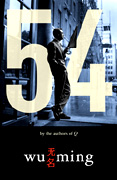While Freedom to Read Week kicks off here in Canada, writers in Italy face widespread censorship that threatens freedom of expression across the country.
Over 50 authors in Italy have already been blacklisted, according to Roberto Bui of Wu Wing Foundation, who writes under the pen name Wu Ming 1.
“The body of literary works involved amounts to several hundreds of books,” said Bui.
The Wu Ming Foundation, who is amongst those blacklisted, is a collective of Italian authors formed in 2000. The collective has group-authored a number of novels, including 54 and Manituana.
According to Bui, the censorship was first proposed by Raffaele Speranzon, minister of culture for the province of Venice, and Elena Donazzan, minister of education for the region Veneto.
Bui said that this past January these two officials asked libraries and public schools to remove all books by authors who had signed a 2004 petition for the release of Cesare Battisti. Battisti is a former leftist rebel who was convicted in absentia of four political murders from the 1970s.
“No law allows blacklisting or holding disobedient librarians responsible for anything,” said Bui. “In fact, this proposal blatantly violated our constitution.”
As a way to fight the rampant censorship, Bui said a group of writers, called Scrittori contro il rogo (Writers Against Book-Burning), was formed.
“We effectively blocked censorship by asking the public to mobilize as they pleased [ . . . ] he said. “We were immediately taken by surprise by the people’s imaginative tactics.”
These tactics included flash mobs in front of Speranzon’s office, parodies on the web and citizens visiting libraries and donating copies of the so-called banned books.
Speranzon and Donazzan eventually withdrew their proposals, said Bui.
However, he said this battle against censorship is far from over.
“[Speranzon] has made another proposal, asking that the 54 authors in his list be declared personae non gratae by the city,” said Bui. “There’s isn’t much chance that this proposal is accepted, but the fact that politicians imagine such a thing is dangerous in the first place.”
Here in Canada, Freedom to Read Week runs Feb. 20-26. Organized by the freedom of expression committee of the Book and Periodical Council, Freedom to Read Week is an annual event that “encourages Canadians to think about and reaffirm their commitment to intellectual freedom,” according to their website.
Franklin Carter, editor and researcher for the freedom of expression committee, said the censorship occurring in Italy is “appalling.”
“I think the affect of censorship, whether it’s officially permitted in law or done locally by a pressure group, is to attack people’s freedom of choice and to attack their intellectual freedom,” said Carter.
According to Carter, democracy does not work well when individuals are denied access to information.
“I want a democracy where people have as much access to good information as they possibly can, so they can participate in society and try to take society forward,” said Carter.
He said censorship can be a problem anywhere, even Canada.
“But I don’t want to overstate it,” said Carter. “Canada, by world standards, is a fairly free and open place. We have a very strong culture of freedom of expression and freedom of the press here.”
However, Carter said that a threat to freedom of expression anywhere in the world is a threat to freedom of expression for everyone.
“There is a line that goes: people are not free as long as other people are not free,” said Carter. “We live in a smaller, much more interconnected world and things that happen in other parts of the world can affect us.”
Ashley Gaboury works as the Copy Editor for the Manitoban and has been published in a variety of outfits including Geez Magazine, the Tyee and the Portage La Prairie Daily Graphic. She also contributes to the Gradzette at the University of Manitoba and is a former Canadian University Press Central Bureau Chief. She is currently completing a B.A. in English at the University of Manitoba.



